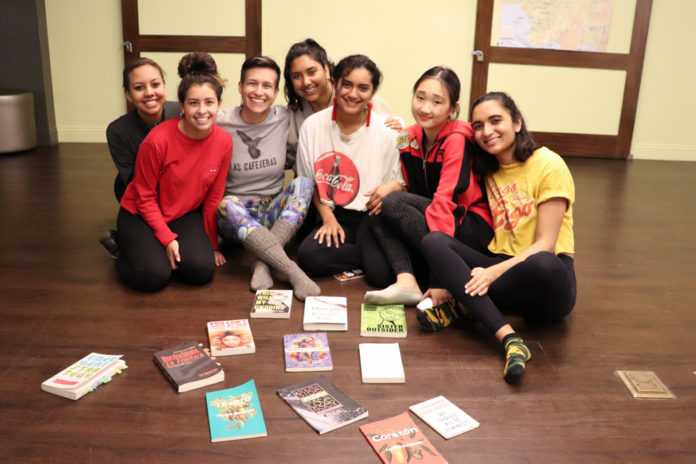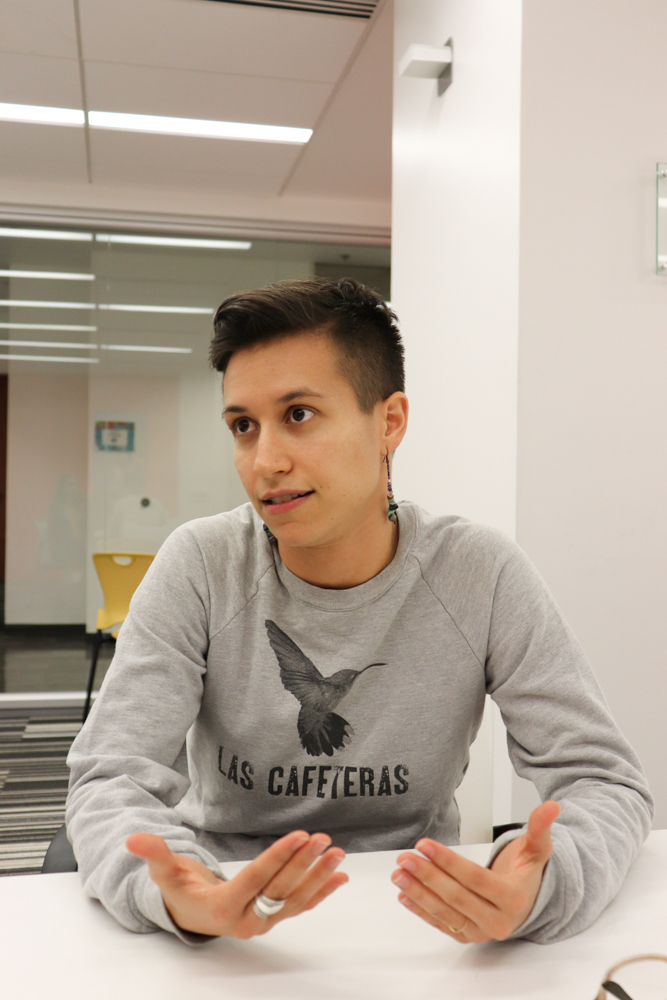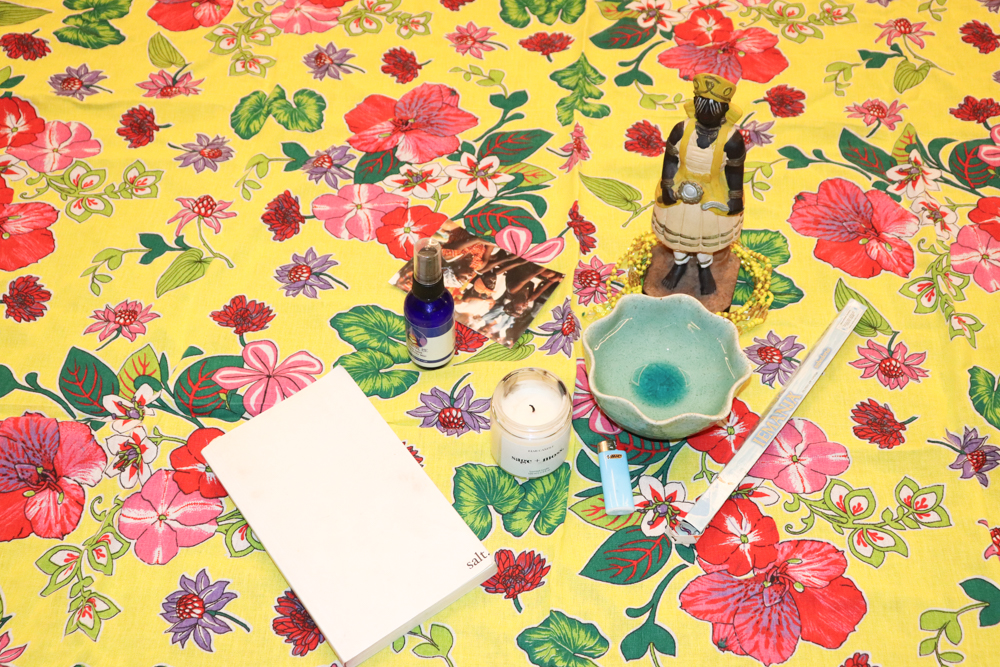
Emmons Wellness Center hosted a “Decolonize Your Body” dance class Feb. 28 in the Bengal Room, a workshop tailored to support women of color on Occidental’s campus. Marina Magãlhes, who teaches a weekly community dance class, Dancing Diaspora, in Lincoln Heights, led the dance class at Occidental. Magãlhes is the daughter of two Brazilian diplomats and explained that she grew up constantly moving around with her family, which largely affected her interest in dance.
“What was consistent in all of those moves was dance, but I always felt quite fragmented in my dance life,” Magãlhes said. “Because there was the kind of dancing I did in the studio and on stage, which was usually white, Western, European forms. And then there was the kind of dancing I did at home. With my family, with friends and in social settings. And those dances were diasporic, Latin dances.”
Magãlhes attended UCLA, where she studied in the Department of World Arts and Cultures. She credits that program with encouraging her to integrate her identity into her dancing and choreography.
“I was interested in dance in this larger sense, having a more worldly perspective and kind of trying to challenge some of the hierarchies that are really present — especially in some of the dance training programs, where you’re expected to train in ballet and modern — and those are seen as the valid forms to work with, and anything else is maybe an elective but not taken as seriously,” Magãlhes said.

Magãlhes was invited to host one of her dance classes at Occidental by Anna Rivera, a staff psychologist at Emmons. Rivera attended one of Magãlhes’ classes in Lincoln Heights and saw it as an opportunity to provide a much-needed space for women of color on campus.
“I coordinated this event because I wanted for there to be a space that women of color could come to and meet other women of color,” Rivera said. “I think students here often feel very isolated — especially people of color, especially women of color— and I hear a lot of individual stories where they feel very disconnected or that they don’t fit in. I think a lot of times that adds to racial stress, moving through the world without really being noticed or being seen or being acknowledged.”
Gabriela Gonzalez (sophomore), who attended the event, expressed her gratitude that this space was offered for women of color, emphasizing the importance of it being offered directly by the college.
“I was cognizant that this was going to be a predominantly brown, female and women-of-color space. Those are hard to find on campus. I like that even though there are clubs like Beauty Beyond Color that offer me that space, that this is something that is coming from Oxy and the institution, from Emmons, that says, ‘We care about our women of color on campus,'” Gonzalez said.
The dance class incorporated the elements of ancestral Afro-Latin dance practices. Magãlhes believes utilizing these dances are an effective way for women of color to begin the decolonization process, dismantling the repression and limitations women of color are burdened with due to the intersection of racism and sexism.
“It seemed fitting to be decolonizing through the body because so much of that has been embodied. And really in a colonial lens, the body is seen as lesser than the mind,” Magãlhes said. “So to decolonize all of that would mean to actually place the body as an important vehicle for knowledge generation and for understanding ourselves and each other.”
The dance class began with a talking circle where each student spoke about their personal experiences as a woman of color and expressed why they attended the event. The dancing started with a series of yoga positions, gradually increasing in intensity. Magãlhes focused on different parts of the body throughout the program, isolating the upper and lower halves of the body in partner exercises. There was an equal mix of individuals freestyling their own movements, both individually and with a partner, as well as the entire group following a choreography led by Magãlhes.
“The event wasn’t what I expected, but in the best way,” Gonzalez said. “I think I learned a lot and it was a very emotional experience. There are moments where the collective energy was overwhelming and it’s not something that I can do justice by just explaining how it felt. It was profound and made me want to cry at times.”

According to Rivera, this type of physical movement holds different therapeutic benefits from traditional therapy practices. Rivera wanted to provide women of color on campus with different options of therapy practices, because people may not know that there are different healing methods.
“If you want to talk about something, great! If you want to kind of move through something, great! The same thing doesn’t work for everyone,” Rivera said. “And the way that movement or that physical expression of pain or emotion or trauma can help is that those things are not always the most organized in our minds. We can’t always describe them in a way that makes sense. We can’t always even access them with words, but sometimes the body can.”
Rivera hopes that this is just the beginning; she encourages students to come forward with any programming ideas and to advocate for what is lacking in terms of supportive resources on campus. Rivera believes engaging with marginalized students at Occidental is the best way to create the most comprehensive programs. Both Rivera and Magãlhes expressed their desire for this space to communicate to women of color on campus that they are both seen and heard.
“Obviously I don’t know your struggle, you don’t know mine, and yet we share so many similarities,” Magãlhes said. “So allowing space for the diversity of our struggles, because we’re not a homogeneous group, [allows us] to witness each other in our differences as well.”
Gonzalez believes this is a strong first step toward creating more spaces for women of color, and she looks forward to the continuation of programs like “Decolonize Your Body.”
“Any other self-care events that acknowledge that we have different experiences on this campus because of our identities would be so validating,” Gonzalez said. “To have those communities be strong enough that they will continue every year and to be something that we can tell prospective students would be ideal.”
An earlier version of this article contained a photo with a caption that incorrectly described Marina Magalhães as a Brazilian spiritual dance instructor. Magalhães identifies as a dance-and-change maker who works with ancestral Latinx dances.
![]()






























